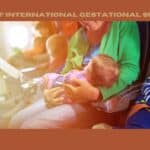This is pretty exciting news:
Sixteen months after being rescued as a frozen embryo from a hospital flooded by Hurricane Katrina, Noah Benton Markham entered the world Tuesday morning and was greeted by his cheering family.
The 8 pound, 61/2-ounce boy was born by Caesarean section at 7:23 a.m. CT (6:23 a.m. ET) at St. Tammany Hospital. He was in good shape, doctors said.
Before the procedure Rebekah and Glen Markham had decided that if their baby was a boy, he would be named after the biblical builder of the Ark. A girl would have been Hannah Mae — Hannah means “God has favored us.” (Watch how the embryos were rescued. ![]() )
)
Relatives gathered around as Glen Markham, grinning proudly, carried the tiny blanket-wrapped bundle topped by a pink-and-blue cap out of the operating room. For a few seconds he tried to make them guess whether the baby was a boy or a girl. Then he said “It’s a boy!” to an eruption of cheers and applause.
Rebekah Markham’s mother, Lezette Crosby, telephoned another relative: “It’s Noah! It’s Noah! It’s a boy!”
“All babies are miracles. But we have some special miracles,” said Wanda Stogner, a cousin of Rebekah Markham.
One of the people who made Noah’s birth possible joined the family shortly after Noah was born and was hugged by both grandmothers.
“I’m the guy who rescued the embryos,” said Roman Pyrzak, lab director for The Fertility Institute of New Orleans.
When Katrina struck, the future Noah was one of 1,400 embryos frozen in canisters of liquid nitrogen at a hospital in eastern New Orleans.
Rebekah Markham, 32, had evacuated before the hurricane with their toddler, Glen Witter “Witt” Markham Jr. Her husband, a New Orleans police officer, stayed to work.
Running from the storm
Mother and son actually evacuated twice. The first time was to relatives’ about a half-hour from their home among 40-foot-tall pine trees in Covington.
But when the storm toppled trees and cut electricity across south Louisiana, that first refuge became a poor place to care for a toddler who had turned 1 only 10 days before Katrina, so they went to Rebekah Markham’s sister’s home in central Louisiana.
A cell phone text message — “R U OK?” — the day after the storm told her that her husband had survived.
He was stationed across the Mississippi River from flooded parts of the city. But it had its own dangers. One member of his squad was shot in the head on August 29 after confronting looters at a gas station.
Markham, 42, never got his wife’s answer to his text query because his phone’s battery was dead. “It was about two weeks before I found out that they were OK,” he said.
In the meantime, Pyrzak and Dr. Belinda “Sissy” Sartor of the Fertility Institute had led seven Illinois Conservation Police officers and three Louisiana State Police officers to the facility in flat-bottomed boats brought from Illinois.
Witt is also an in-vitro baby. His embryo was created at the same time as Noah’s, but it was implanted immediately, while five others were frozen in case of miscarriage.
The Markhams aren’t sure they’ll have a third child.
“I thought three would be the ideal number,” Rebekah Markham has said. But her medical problems have required bed rest for the first three months of each pregnancy. “And I was even more sick with this one than with Witt.”
They also needed a lot of family help to take care of Witt, a boy who never seems to stop running. So any decision probably will be postponed until both children are in school.
Copyright 2007 The Associated Press. All rights reserved.This material may not be published, broadcast, rewritten, or redistributed.
Author Profile

- Jennifer Lahl, MA, BSN, RN, is founder and president of The Center for Bioethics and Culture Network. Lahl couples her 25 years of experience as a pediatric critical care nurse, a hospital administrator, and a senior-level nursing manager with a deep passion to speak for those who have no voice. Lahl’s writings have appeared in various publications including Cambridge University Press, the San Francisco Chronicle, the Dallas Morning News, and the American Journal of Bioethics. As a field expert, she is routinely interviewed on radio and television including ABC, CBS, PBS, and NPR. She is also called upon to speak alongside lawmakers and members of the scientific community, even being invited to speak to members of the European Parliament in Brussels to address issues of egg trafficking; she has three times addressed the United Nations during the Commission on the Status of Women on egg and womb trafficking.
Latest entries
 infertilityApril 23, 2024The Rise of International Gestational Surrogacy in the U.S.
infertilityApril 23, 2024The Rise of International Gestational Surrogacy in the U.S. Assisted Reproductive TechnologyApril 16, 2024Founder Jennifer Lahl’s Speech on Surrogacy to the Casablanca Declaration
Assisted Reproductive TechnologyApril 16, 2024Founder Jennifer Lahl’s Speech on Surrogacy to the Casablanca Declaration #BigFertilityFebruary 27, 2024No, Alabama Didn’t Ban IVF
#BigFertilityFebruary 27, 2024No, Alabama Didn’t Ban IVF ArticleSeptember 25, 2023The Little Engine That Could
ArticleSeptember 25, 2023The Little Engine That Could

